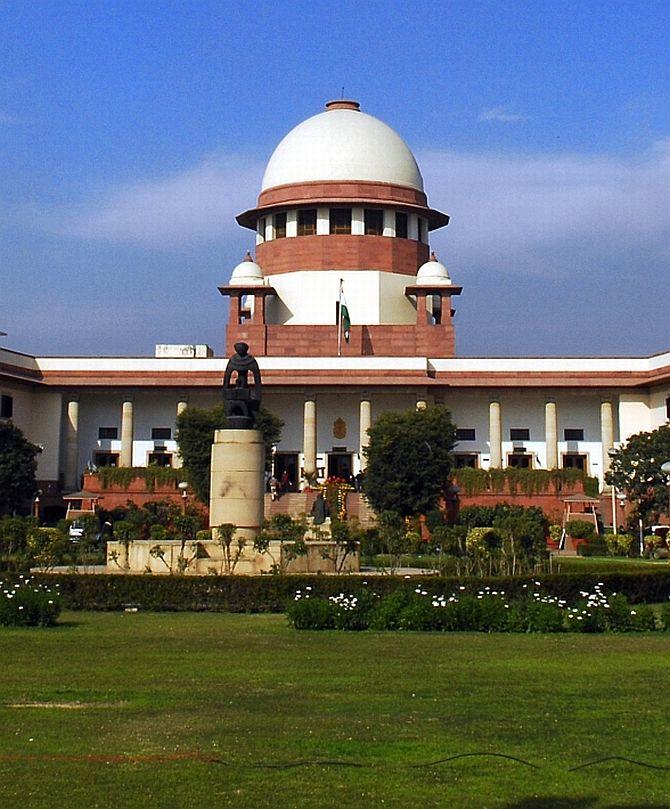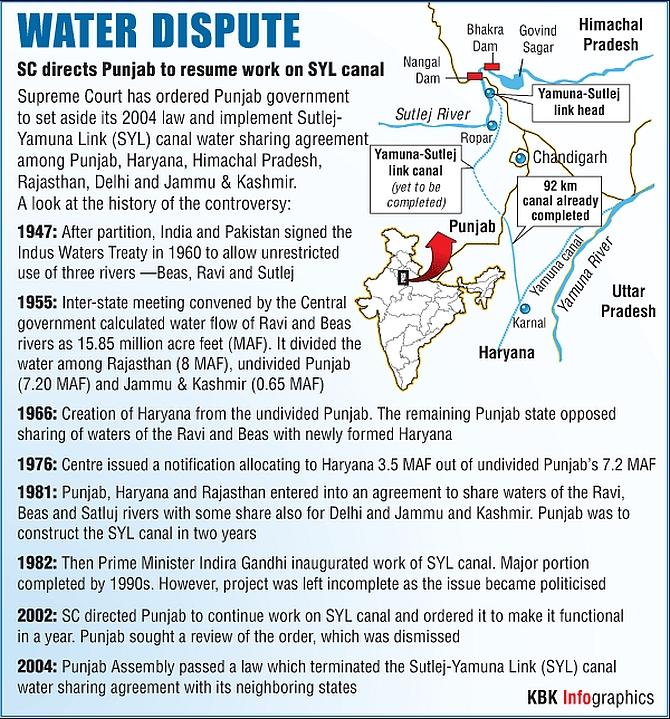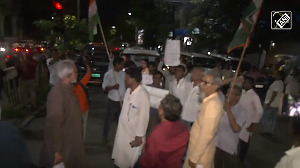 Supreme Court's ruling favouring Haryana on the contentious Sutlej-Yamuna Link canal issue has set political temperature soaring in Punjab, with the state Congress chief Amarinder Singh quitting as Member of Parliament and all MLAs following suit, as Chief Minister Parkash Singh Badal asserted "not a drop of water" will be allowed to be taken out of the state.
Supreme Court's ruling favouring Haryana on the contentious Sutlej-Yamuna Link canal issue has set political temperature soaring in Punjab, with the state Congress chief Amarinder Singh quitting as Member of Parliament and all MLAs following suit, as Chief Minister Parkash Singh Badal asserted "not a drop of water" will be allowed to be taken out of the state.
A major confrontation between the Supreme Court and Punjab government also appeared a distinct possibility with the state's SAD-BJP government asserting it would appeal to the President not to accept the advice of the Apex court.
Addressing a press conference after a hurriedly called meeting of the state's council of ministers, Badal, with son and deputy Sukhbir by his side, declared "not a single drop of water will be allowed to be taken out of the state... water comes first for us."
Sukhbir said a special session of the state assembly has been called on November 16 where the government will adopt a resolution appealing to the President not to accept the advice of the Supreme Court, which had ruled a state which is a party to an agreement cannot unilaterally terminate it or nullify the decree of the highest court in the country.
Earlier on Thursday, the Supreme Court, while disposing of the Presidential reference said,"All the questions have been answered in the negative".
The reference had been made by the then President A P J Abdul Kalam on the constitutional validity of the law passed by then Punjab government led by Captain Amrinder Singh to nullify the court verdict and unilaterally terminating the almost three-dacade old SYL water sharing agreement.
Amarinder, Lok Sabha MP from Amritsar, also demanded imposition of President's rule in the state and suggested holding the assembly elections in December, voicing apprehension that a "mischievous" Badal government may try to "foment trouble" following the court order.
In its judgement, a five-judge bench headed by Justice A R Dave made it clear that the Punjab Termination of Agreements Act, 2004 was "unconstitutional" and that Punjab could not have taken a "unilateral" decision to terminate the water sharing agreement with Haryana, Himachal Pradesh, Rajasthan, Jammu and Kashmir, Delhi and Chandigarh.
The apex court ruling saw the festering dispute over water sharing between Punjab, which will go to polls early next year, and Haryana, immediately catapulted to political centrestage with Amarinder upping the ante and announcing his decision to resign as MP and announcing that the MLAs have also tendered their resignation "in protest against the injustice meted out to the state". He said the MLAs will meet the assembly speaker on Friday to formally put in their papers.
Amarinder, under whom the controversial law had been enacted to abrogate the agreement, said he had sent his resignation to the Lok Sabha Speaker and sought an appointment with her next week. For the resignation of an MP or MLA to be accepted, they have to submit their letters to the Speaker personally.
Blaming the Akalis squarely for bringing the people of Punjab to "this pitiable situation", where they face "imminent devastation" due to acute water scarcity, Amarinder said Badal and his team had failed to defend Punjab’s stand in the court, leading to such "disastrous consequences" for the state.
The Congress leader accused the Akalis of being instrumental in acquiring the land for the Sutlej-Yamuna Link Canal, ignoring the interest of Punjab.
Amarinder said, "Badal issued the notification for land acquisition for the SYL on February 20, 1978 vide notification nos: 113/5/SYL and 121/5/SYL under section 4 of the Land Acquisition Act. With this, the process of land acquisition started.
"Badal wrote to Haryana overnment letters demanding payment of Rs 3 crore more as he had already taken Rs 2 crore for the purpose. This was in follow up to an agreement between him and Devi Lal, the then chief minister of Haryana that Haryana will pay Rs 5 crores to Punjab (for SYL)."

Sukhbir Badal hit back, saying the then Prime Minister Indira Gandhi had forced Congress Chief Minister Darbara Singh to sign the agreement.
"It is a well known fact that PPCC President Capt Amarinder Singh welcomed the then Prime Minister Indira Gandhi in 1982 to lay the foundation of SYL canal at Kapoori. It was Akali Dal government which stopped it and did not allow water to be taken out of the state.
"Come what may, we will not allow even a single drop of precious river water of Punjab to go outside the state," he said.
Haryana Chief Minister Manohar Lal Khattar, whose state hopes to gain from the SC ruling, meanwhile, urged the political parties to respect the apex court's ruling and not politicise it.
With his party BJP's ally Shiromani Akali Dal strongly opposing the SC ruling, Khattar said, "Punjab government is not bigger than the Supreme Court, which has given its advice. Now the President will decide on it. I hope that the decision is amicably implemented immediately."
On the assertion by the Badals that not a single drop of water will be allowed to be taken outside the state, Khattar said,"It is a multi-state agreement. Ours is a federal democracy and it should be respected."
Meanwhile, Arvind Kejriwal's AAP, which has decided to plunge into the Punjab elections in a big way, accused both the ruling SAD and opposition Congress of failing to protect the state's interest and announced an indefinite dharna at Kapoori, where the foundation stone for the SYL canal was laid, from Friday.
"The SAD and Congress have failed to protect the interest of Punjab on river water issue," AAP leader and lawyer H S Phoolka said.
"The Badal government could have forced the Centre to withdraw the notification issued by the then Central government in 1976 which stated that SYL be constructed to give water to Haryana," Phoolka said.
He also described Amarinder Singh's resignation from Lok Sabha as "mere drama". Apart from Amarinder, Congress has two other Lok Sabha MPs from Punjab.
"There is no meaning of resignation by Amarinder as it was the Congress-led government at the Centre which had decided to get the SYL canal constructed. If Amarinder is really serious about state's interest he should resign from the Congress," he said.
Congress, which is trying to stage a comeback to power in Punjab after nearly a decade, however, appeared divided on the issue of SC verdict.
While on one hand Amarinder made a strident pitch against SC order, Congress's chief spokesman Randeep Surjewala, a Haryanavi, said," Justice has won in the Supreme Court. The two and a half crore people of Haryana should now have closure."
"This is the litmus test of Prime Minister, Narendra Modi to do justice and honour his constitutional responsibility. Ball lies in the court of PM Modi.
"All the three governments -- Central Government, Punjab government and Haryana government, belong to BJP. Onus is on Modi ji to fulfil the solemn responsibility to the Constitution, implement the law and enforce the orders of the Supreme Court," Surjewala said.
Another Congress spokesperson Tom Vadakkan said the party would come out with an apropriate reaction soon after details of the verdict are available.
"We are dealing with two states, in which the BJP plays a prominent role. We would expect the Prime Minister to have an interface with both sides and find solutions. So the ball is in the court of the Prime Minister.
"The challenge is before the Prime Minister. Solutions need to be found and this can only be processed through dialogue and not monologue from both sides," he said.






